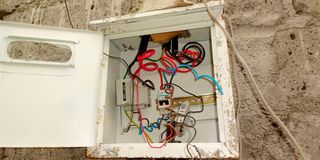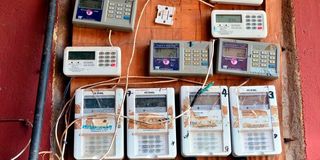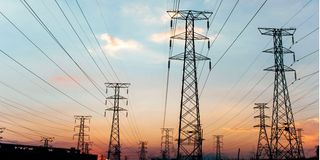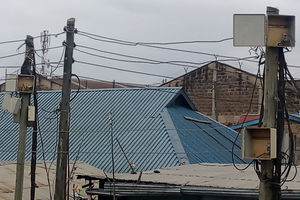
Token equipment removed by Kenya Power worker at Peter Kiiru homestead at Green Valley, Kamulu, January 28, 2025.
For more than eight years, a well-connected syndicate familiar with the inner workings of Kenya Power has swindled hundreds of homeowners out of their hard-earned cash dishing out fake electricity connections in Green Valley, Kamulu, Nairobi.
The faceless cartel that operates from neigbouring Mukuru slums has been issuing application forms, approving connections, collecting connection fees, and installing power for both domestic and commercial use.
Residents and local leaders suspect the fraudsters work in cahoots with rogue Kenya Power engineers who approve and enter the illegal connections into the utility company’s official database.

Kenya Power Company employee carries out repairs on a power transformer.
Hundreds of home and business owners, who were hoodwinked to believe they were genuine Kenya Power customers, continued to invest in their power connections, buying tokens and even replacing faulty metres.
The swindle, which started in 2016, went on for years when the local Kenya Power office in Ruai smoked out metres that were assigned to Mukuru electricity schemes in Green Valley and its environs.
Blackouts
For the last two weeks, more than 100 homes and businesses have been in pitch darkness after Kenya Power disconnected electricity lines and carted away poles.
Among those disconnected are tens of residents who recently acquired electricity through the government-sponsored last-mile connectivity project.
Also Read: Kenya Power loses 110 transformers in a year
The move has elicited uproar among the residents who claim to have legally acquired electricity.
Ms Veronicah Wanjiru, who has been living in the area for more than four years, says she paid Sh203,000 for a connection in 2016.
According to her, Kenya Power staff connected electricity from the left side of the estate. After a year, the company told her that her power should have come from the right and altered the connection.
“I proceeded to Stima Plaza and was given a quotation of the amount required for the connection. Having paid the amount, the company sent workers who installed the power successfully. After a year, they claimed my connection was faulty and had to be replaced,” she told the Nation.
'Rogue employees'
Ms Eunice Wanyaga Njagi, who has lived in the village for 13 years now, described how the area was initially without power.
Two years after moving in, she joined seven other villagers and sought a contractor from Kenya Power to facilitate an electricity connection.
“We were given a quotation of Sh456,000, which was way too expensive. They told us to look for a contractor who would set up a power line for us. We raised our funds and paid after filling out forms from the company,” stated Njagi.
During the disconnection, Kenya Power employees not only removed poles and power lines but also confiscated Ms Njagi’s water pump, accusing her of using electricity illegally.

A prepaid electricity token machine provided by Kenya Power at an apartment in Nairobi.
“They stormed my home, shouting that my water pump was using their power without payment and took it away. My child was so frightened that he ran outside,” she recalls.
For Ruth Wambui, another victim of the swindle at the Athi area, Kamulu, she was connected under the government's Last Mile Connectivity Programme that targeted universal electricity by 2020.
“Some employees from Kenya Power came installed poles, and connected power to our houses. We have enjoyed the services since 2017. The company would ensure that faults in electricity were immediately attended to any time they occurred,” said Ms Wambui.
But she was shocked when the company used power saws to cut down the poles, claiming they were unauthorised.
“If this electricity was illegal, why have we been buying tokens from Kenya Power? If they were illegal connections, where did they come from? The poles, wires, and tokens all belong to Kenya Power,” she argued.
She dismissed claims by Kenya Power that their electricity metres were registered to other locations. She checked that her meter bore her name, and claimed the company also had records that proved their connections.
“We have been in darkness since Monday (January 20). We have to walk long distances to charge our phones. Kenya Power should have involved the area chief and informed us instead of cutting us off without warning,” she lamented.
Area residents are fearful for their safety as the darkness has made them vulnerable to wild animals, including leopards, roaming in the night. Mr Maina Njoroge, a resident, said they now rush home early to avoid possible attacks.

Kenya is under renewed pressure to boost power generation as reserves dwindle.
He asked Kenya Power to refund the money they spent in acquiring the electricity, suggesting they could use the funds on solar installations instead.
“At night, we can't walk safely. CCTV cameras have captured wild animals roaming. If our electricity was illegal, why did we pay for the connections and continue buying tokens?” he said.
Mostly illegal
A local elder who requested anonymity, fearing reprisals from the affected families, told the Nation that nearly 80 per cent of the affected electricity connections were illegal.
“We have advised these residents several times to go to Kenya Power’s Ruai branch to confirm their token purchases and register properly,” he said.
He admitted some genuine connections were also switched off but said the power row had been simmering since 2020.
Documents seen by the Nation show that some of those who applied for the last-mile connectivity have also been affected. The group with more than 15 members paid Sh7.6 million to be connected to the national grid.
“Kindly pay this amount in the time of 90 days from the date of this letter. If the payment is not received in this period, the terms may be revised,” stated the quotation letter dated August 12, 2024.
Contacted, Kenya Power’s Ruai branch manager Faith Wambua said the electricity was disconnected due to revenue losses.

Kenya Power offices on Aga Khan Walk in Nairobi.
“Our supervisors kept questioning why we were failing to generate revenue. Investigations revealed that many people were using illegal electricity connections,” she said.
The residents, she added, had illegally acquired power, adding that the prepaid meters in the area were originally assigned to informal settlements such as Mukuru.
“Every area has its allocated equipment. For example, there is a house owner called Milcah Njoki who is on our register, but her token metre is still registered under James Mburu from Mukuru,” she said.
Wambua said the affected residents were hoodwinked into believing they were legally connected, saying rogue electricians had given them fake Kenya Power application forms.
“Some people use our company’s name to their advantage. Most of them are good electricians who give fake forms, and the residents end up believing they are dealing with Kenya Power,” she said.
Complaints
Kasarani Member of Parliament Ronald Karauri confirmed receiving complaints from affected residents.
He accused Kenya Power of using poles and wires from disconnected schemes in Nairobi for rural electrification projects under the last-mile connectivity initiative.
“We cannot leave our people in darkness as we focus on rural electrification. That is unacceptable. I was shocked to see workers using power saw machines to cut down the poles,” said Karauri.
He condemned rogue Kenya Power engineers for stealing from Green Valley residents.
“Kenya Power installed the poles. I have received several electricity bills from them. If they quoted Sh1 million for a connection, why did an employee ask residents to pay Sh300,000 to install power through the backdoor?” he said.
“Security has worsened, and children can no longer study effectively. I just met with the Energy Minister but all the plans seem to be for the rural areas. We will not sit idly by and watch our people mistreated. Those poles and lines belong to them.”







